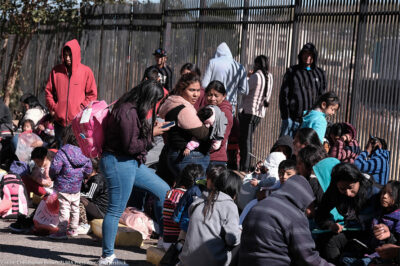Hundreds of Immigrants Will Finally Become U.S. Citizens Under Terms of Lawsuit Settlement
LOS ANGELES – Immigrants who waited for years for their citizenship applications to be processed due to extraordinary backlogs will finally have the chance to become Americans and enjoy the privileges of citizenship, under the terms of a settlement announced today between the U.S. Citizenship and Immigration Services (USCIS), the National Immigration Law Center, the ACLU of Southern California, the Asian Pacific American Legal Center and the law firm of Munger, Tolles & Olson.
The settlement puts an end to indefinite delays in processing naturalization applications caused by routine FBI background checks, and requires USCIS to adjudicate hundreds of citizenship applications from the Los Angeles, Santa Ana, and San Bernardino areas within six months. It also requires the federal government to provide naturalization data from the Los Angeles area to the legal groups who filed the lawsuit, in order to ensure
that lengthy processing delays do not recur.
“The backlog fundamentally altered the lives of tens of thousands of permanent residents whose citizenship applications disappeared into an administrative black-hole,” said Linton Joaquin, general counsel for the National Immigration Law Center.
“Thousands of individuals were kept in the dark for years about the reason for the delay and were unable to push their applications through to adjudication. Through this litigation and settlement, the government can no longer sit indefinitely on these applications, but must finally resolve whether they can become Americans.”
The legal groups filed a class action lawsuit in 2007 to address years-long bottlenecks in processing citizenship applications caused by routine FBI background checks, known as “FBI name checks.” The checks, mandated by USCIS in 2002, clogged the system despite federal laws that require the agency to process applications within six months of submission. As a result of the lawsuit, the FBI, under court supervision, finally ran the background checks on thousands of people who were endlessly stuck in the backlog.
“The naturalization process has been a bureaucratic nightmare for so many permanent residents who did everything right to become citizens of this country,” said Jennie Pasquarella, staff attorney with the ACLU/SC. “Many spent thousands of their hard-earned dollars and pored over endless documents, only to be met with red tape at every corner. This restores the dream of citizenship and ensures that the government will be accountable.”
Plaintiff Sonali Kolhatkar, a United Arab Emirates-born investigative journalist and radio host for KPFK in Los Angeles who waited more than three years for her citizenship application to be processed, is among the hundreds who were affected by the FBI name checks and resulting delays. Kolhatkar, who came to the United States on a student visa in 1999, has been married to a U.S. citizen for nine years, with whom she has a U.S. citizen daughter. While Kolhatkar waited for her application to be processed, her supervisors would not allow her to cover events where there was police presence, such as peaceful protests, fearing that she might get arrested and endanger her citizenship application. She also was unable to vote in the historic 2008 presidential election. As a result of the lawsuit, Kolhatkar’s application was finally adjudicated and she was sworn in as a U.S. citizen.
“The bureaucratic delays that keep people from becoming citizens not only violate federal law, but significantly harm people’s lives,” said Mark Yoshida, co-counsel and staff attorney with the Asian Pacific American Legal Center. “The USCIS had noted that it needs a tremendous amount of manpower to process the applications of future citizens. This settlement holds the government accountable to its obligation to review the citizenship requests of future Americans in a timely fashion.”
Added Jacob Kreilkamp, attorney for Munger, Tolles & Olson, “These people will finally get a chance to restart their lives with a secure immigration status. This change will be felt not only by the hundreds of people whose applications were in limbo, but by all of their friends and loved ones as well.”





